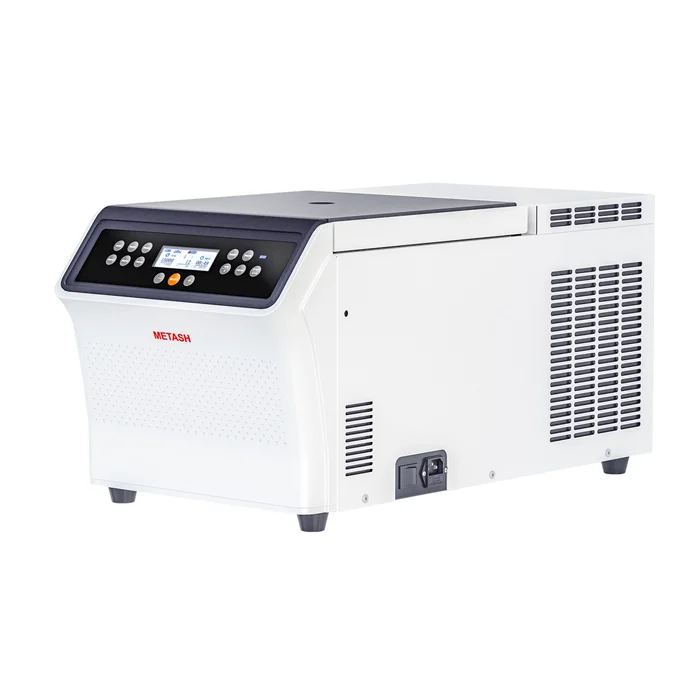- This topic is empty.
-
AuthorPosts
-
2025-03-19 at 4:07 pm #85174
Benchtop refrigerated centrifuges are indispensable in laboratory settings, playing a crucial role in sample separation across various scientific fields, including biology, chemistry, and clinical diagnostics. In this blog post, Metash, a high speed centrifuge equipment manufacturer, will share the routine maintenance of benchtop refrigerated centrifuge machine for laboratory. It can not only extend the life of the centrifuge, but also ensure accurate and reproducible results while minimizing the risk of operational failure.
Importance of Benchtop Refrigerated Centrifuge Machine Maintenance
A well-maintained benchtop refrigerated centrifuge operates efficiently, reducing downtime and preventing costly repairs. Since these machines deal with sensitive biological and chemical samples, any operational failure could compromise experiments or diagnostic processes. Routine maintenance enhances the reliability, accuracy, and safety of the machine while preventing contamination and mechanical wear.

Essential Maintenance Practices of Benchtop Refrigerated Centrifuge Machine
1. Regular Cleaning and Disinfection
Routine cleaning is fundamental to maintaining a benchtop refrigerated centrifuge. Follow these steps to keep the machine clean and free from contaminants:
– Exterior Cleaning: Wipe the outer surface with a lint-free cloth and a mild detergent solution to remove dust and spills.
– Rotor and Chamber Cleaning: After each use, clean the rotor, chamber, and lid with a damp cloth and mild disinfectant to prevent sample residue buildup.
– Spill Management: In case of spills, immediately clean the affected areas to prevent corrosion and contamination.
– Avoid Abrasive Cleaners: Do not use harsh chemicals that could damage the internal components.
2. Rotor Maintenance
The rotor is a critical component responsible for sample separation. To maintain its efficiency:
– Inspect for Cracks or Corrosion: Regularly check the rotor for signs of wear, cracks, or pitting, as these defects can lead to imbalances and accidents.
– Proper Handling: Always use appropriate handling techniques to avoid unnecessary strain on the rotor.
– Lubricate the Rotor Spindle: Apply a thin layer of grease to the spindle to prevent friction and wear.
– Balanced Loading: Always balance samples properly to avoid excessive strain on the rotor and motor.
3. Temperature Control Checks
Since refrigerated centrifuges maintain specific temperature settings, monitoring the cooling system is crucial:
– Check Temperature Settings: Regularly verify that the machine maintains the correct temperature range during operation.
– Monitor the Cooling Efficiency: If the centrifuge struggles to reach or maintain the set temperature, the refrigeration system may need servicing.
– Keep the Ventilation Clear: Ensure that the vents and air filters are free from dust and obstruction to facilitate proper airflow.
4. Inspection of Electrical Components
A benchtop refrigerated centrifuge contains several electrical components that require regular inspection:
– Check Power Cords and Plugs: Ensure that power connections are intact and free from damage.
– Monitor Display and Controls: If there are flickering displays or unresponsive buttons, seek professional servicing.
– Ensure Secure Wiring: Loose connections or exposed wires can pose safety hazards and affect machine performance.
5. Calibration and Performance Testing
To maintain precision and accuracy:
– Regular Speed Verification: Use a tachometer to confirm that the rotor speed matches the displayed setting.
– Temperature Calibration: Periodically check the accuracy of temperature readings and recalibrate if necessary.
– Time Settings: Ensure the timer functions correctly to avoid errors in centrifugation cycles.
6. Preventative Lubrication
Lubrication of moving parts ensures smooth operation:
– Apply Lubricants as Recommended: Follow the manufacturer' s guidelines for lubricating bearings and hinges.
– Avoid Over-Lubrication: Excess lubrication can attract dust and cause buildup, leading to inefficiencies.
7. Documentation and Scheduled Servicing
Maintaining detailed records of maintenance activities helps track the centrifuge' s performance and detect recurring issues.
– Keep a Maintenance Log: Record each cleaning, inspection, and repair.
– Follow Manufacturer' s Service Schedule: Adhere to scheduled professional servicing to detect and fix hidden problems.
– Train Laboratory Staff: Ensure all users are well-trained on maintenance protocols to prevent misuse.
Troubleshooting Common Issues of Benchtop Refrigerated Centrifuge Machine
Despite regular maintenance, occasional issues may arise. Here are some common problems and their solutions:
– Excessive Noise or Vibration: Check for improper rotor balancing or loose components.
– Failure to Reach Set Speed: Inspect the motor, belt, or rotor for issues.
– Inconsistent Cooling: Ensure proper ventilation and check the refrigeration unit for faults.
– Lid Lock Malfunction: Verify the locking mechanism and clean the lid seal.
Conclusion
Routine maintenance of a benchtop refrigerated centrifuge is crucial for ensuring its efficiency, accuracy, and longevity. Regular cleaning, rotor inspection, temperature monitoring, electrical component checks, and calibration play a vital role in preventing operational failures. By following a consistent maintenance schedule and adhering to manufacturer guidelines, laboratory professionals can optimize the performance of their centrifuge, minimize downtime, and maintain the integrity of their samples.
http://www.metashcorp.com
Metash -
AuthorPosts
- You must be logged in to reply to this topic.